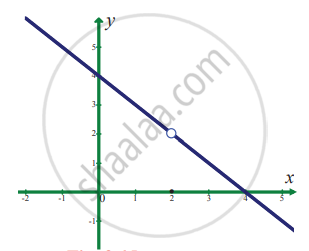Advertisements
Advertisements
Question
Evaluate the following limits:
`lim_(x -> 1) (root(3)(7 + x^3) - sqrt(3 + x^2))/(x - 1)`
Solution
`lim_(x -> 1) (root(3)(7 + x^3) - sqrt(3 + x^2))/(x - 1) = lim_(x -> 1) (root(3)(7 + x^2) - 2 + 2 sqrt(3 + x^2))/(x - 1)`
= `lim_(x -> 1) ((7 + x^3)^(1/3) - 2)/(x - 1) - lim_(x -> 1) ((3 + x^2)^(1/2) - 2)/(x - 1)`
= `lim_(x -> 1) ((7 + x^3)^(1/3) - (8)^(1/3))/(x^3 - 1) xx (x^3 - 1)/(x - 1) - lim_(x -> 1) ((3 + x^2)^(1/2) - (4)^(1/2))/(x^2 - 1) xx (x^2 - 1)/(x - 1)`
= `lim_(x -> 1) ((7 + x^3)^(1/3) - (8)^(1/2))/((7 + x^3) - 8) xx ((x - 1)(x^2 + x + 1))/(x - 1) - lim_(x -> 0) ((3 + x^2)^(1/2) - (4)^(1/2))/((3 + x^2) - 4) xx ((x + 1)(x - 1))/(x - 1)`
= `lim_(x -> 1) ((7 + x^3)^(1/3) - (8)^(1/2))/((7 + x^3) - 8) xx (x^2 + x + 1) - lim_(x _> 1) ((3 + x^2)^(4)^(1/2))/((3 + x^2) - 4) xx (x + 1)`
`lim_(x -> "a") (x^"n" - "a"^"n") = "na"^("n" - 1)`
= `1/3(8)^(1/3 - 1) (1^2 + 1 + 1) - 1/2(4)^(1/2 - 1) (1 + 1)`
= `1/3(8)^(-2/3) (3) - 1/2 xx (4)^(-1/2) xx (2)`
= `(2^3)^(-2/3) - (2^2)^(- 1/2)`
= `2^(-2) - 2^(-1)`
= `1/2^2 - 1/2`
= `1/4 - 1/2`
= `(1 - 2)/4`
= `- 1/4`
APPEARS IN
RELATED QUESTIONS
Evaluate the following limit :
`lim_(x -> 1)[(x + x^2 + x^3 + ......... + x^"n" - "n")/(x - 1)]`
Evaluate the following limit :
`lim_(z -> "a")[((z + 2)^(3/2) - ("a" + 2)^(3/2))/(z - "a")]`
Evaluate the following :
Given that 7x ≤ f(x) ≤ 3x2 – 6 for all x. Determine the value of `lim_(x -> 3) "f"(x)`
In problems 1 – 6, using the table estimate the value of the limit.
`lim_(x -> 2) (x - 2)/(x^2 - x - 2)`
| x | 1.9 | 1.99 | 1.999 | 2.001 | 2.01 | 2.1 |
| f(x) | 0.344820 | 0.33444 | 0.33344 | 0.333222 | 0.33222 | 0.332258 |
In exercise problems 7 – 15, use the graph to find the limits (if it exists). If the limit does not exist, explain why?
`lim_(x -> 2) f(x)` where `f(x) = {{:(4 - x",", x ≠ 2),(0",", x = 2):}`
Sketch the graph of a function f that satisfies the given value:
f(0) is undefined
`lim_(x -> 0) f(x)` = 4
f(2) = 6
`lim_(x -> 2) f(x)` = 3
If the limit of f(x) as x approaches 2 is 4, can you conclude anything about f(2)? Explain reasoning
Evaluate the following limits:
`lim_(sqrt(x) -> 3) (x^2 - 81)/(sqrt(x) - 3)`
Evaluate the following limits:
`lim_(x -> 0) (sqrt(1 + x) - 1)/x`
Evaluate the following limits:
`lim_(x -> 0) (sqrt(1 - x) - 1)/x^2`
Evaluate the following limits:
`lim_(x -> 5) (sqrt(x - 1) - 2)/(x - 5)`
Evaluate the following limits:
`lim_(x -> oo) (1 + x - 3x^3)/(1 + x^2 +3x^3)`
Show that `lim_("n" -> oo) 1/1.2 + 1/2.3 + 1/3.4 + ... + 1/("n"("n" + 1))` = 1
A tank contains 5000 litres of pure water. Brine (very salty water) that contains 30 grams of salt per litre of water is pumped into the tank at a rate of 25 litres per minute. The concentration of salt water after t minutes (in grams per litre) is C(t) = `(30"t")/(200 + "t")`. What happens to the concentration as t → ∞?
Evaluate the following limits:
`lim_(x -> oo) (1 + 3/x)^(x + 2)`
Evaluate the following limits:
`lim_(alpha -> 0) (sin(alpha^"n"))/(sin alpha)^"m"`
Evaluate the following limits:
`lim_(x - oo){x[log(x + "a") - log(x)]}`
Evaluate the following limits:
`lim_(x -> oo) ((x^2 - 2x + 1)/(x^2 -4x + 2))^x`
Choose the correct alternative:
`lim_(x -> 0) (8^x - 4x - 2^x + 1^x)/x^2` =
`lim_(x→0^+)(int_0^(x^2)(sinsqrt("t"))"dt")/x^3` is equal to ______.
